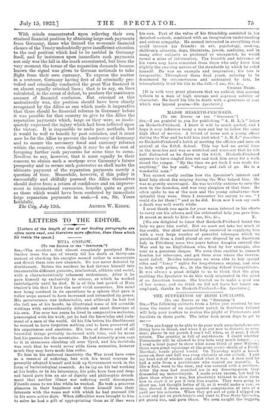LETTERS TO THE EDITOR.
[Letters of the length of one of our leading paragraphs are often more read, and therefore more effective, than those which fill treble the space.]
HUTA ONSLOW.
[To me EDITOR Or THE " SPECTATOR."]
Ste,—The accident that almost completely paralysed Huia Onslow from the age of twenty till his death at thirty-one instead of checking his energies seemed rather to concentrate and divert them into new channels. He was never defeated by disablement. Before the accident he had thrown himself into innumerable different pursuits, intellectual, athletic and social, with a characteristically vehement enthusiasm. After it he gave himself up exclusively to science, at which he worked indefatigably until he died. It is of this last period of Finis. Onslow'e life that I have the most vivid memories. His mind Mow being confined in its operations to a sphere that gave it fuller scope seemed to have increased and intensified its power. His perseverance was indomitable, and although he had lost the full use of his hands, he illustrated some of his scientific writings with extraordinarily delicate and exact drawings of his own. For over ten years he lived in comparative seclusion, preoccupied with his work, yet he had the knowledge and judg- ment of a man of the world. Of his life before his disablement he seemed to have forgotten nothing and to have preserved all his -experiences and emotions. His love of flowers and of all beautiful things probably increased with time, and he never lost his passion for the mountains. He had formerly given vent to it in strenuous climbing all over Tyrol, and his fortitude was such that he would never stifle these memories, however much they may have made him suffer.
To him in his enforced inactivity the War must have come as a renewal of suffering, but with his usual courage he promptly adapted himself and took up Government work in the form of bacteriological research. As he lay on his bed working st his books, or in his laboratory, his pale, •keen face and deep- -red beard gave him an air of dignity and philosophic detach- ment that neither illness nor suffering could discompose. 'Friends came to see him while he worked. He took a generous .pleasure in their happiness and -threw himself into their *interests with the same zest with which he had pursued life En his more active days. When difficulties were brought to him to solve he had a gift of appropriating them .as if they were his own. Part of the value of his friendship consisted in his detached outlook, combined with an imaginative understanding and ardent sympathy. He seemed interested in everything that could interest his friends : in art, psychology, cooking, children's ailments, dogs, literature, jewels, medicine, and in many other subjects as profound or unexpected, he would reveal a mine of information. The breadth and tolerance of his views may have concealed from those who only knew him slightly the exacting nature of the standards by which he ruled himself. He was an example and inspiration; his loss is irreparable. Throughout these final years, refusing to be dominated by circumstances and undaunted by fate, he triumphantly lived his life to the full.—I am, Sir, &c.,
CHARLES MEADE.
[It is with very great pleasure that we publish this moving tribute to a man of high courage and supreme nobility of character. He faced his life in death with a greatness of soul which was beyond praise.—En. Spectator.]


































 Previous page
Previous page